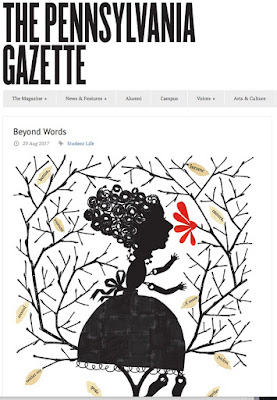Not along ago, my friend Trey Popp wrote a thought-provoking piece in the
Pennsylvania Gazette about MOOCs—massive open online courses. Trey enrolled, he persevered, he researched, he wrote. He made us think about the future of education.
MOOCs again take center stage in this week's issue of
The New Yorker, where Nathan Heller asks,
Has the future of college moved online? Under the guise of research, I stopped to read the piece in full. To think again about a topic that, in many ways, unnerves me.
MOOCs can, of course, be wonderfully supplemental; I've eyed a few courses myself. It can provide, for many, access to ideas and knowledge that simply didn't exist (for those many) before. There are plenty of barriers that get thrown down in the path of those wanting to learn—financial, physical, geographic—and for these hundreds of thousands, millions, even, a MOOC can be life raft material. It can equalize. It can secure.
But as a teacher in a small, crowded classroom on the University of Pennsylvania campus, as a mere adjunct who learns, time and again, that it's not the material I obsessively prepare that matters most, but the spontaneous combustion inside the teaching moment, I worry that the MOOC concept—taken too far, taken to unwarranted extremes—will slowly diminish that which I value most, and what my students (ask them) value, too.
The errant conversation. The tangential. The nonlinear. The relationships—real, non-crowdsourced—that build over time. In my classroom, I watch the postures and faces of my students. I see what they are hiding behind or wanting to express or struggling through. I show up early because I know that one, at least, will be showing up early, too—not to talk about the course, per se, but to talk about the bigger things that they are working through. Private and personal things. Internet aversive things. Nothing they'd ever want another soul to "like."
I teach memoir and literary profile. My students write weekly, read books, are read to. They do the work, and they grow as writers, but what matters perhaps even more is how they grow as people. How, through the writing work, they come to know themselves and broaden the way they think about others. How they allow language to release them, even relieve them. My students enter the room as strangers to one another other, and whether they are Wharton enrolled or bioengineers, future veterinarians or English professors, super geniuses who have essentially skipped through school or students from other lands just learning English, they forge a community that would not exist without the scratched table, the box of cookies, the breeze blowing through the velvet curtains.
All the while I'm learning, too. I'm forging the same life-long bonds. Taking the train to NYC to attend the engagement party of a recent graduate. Sending love to a once student/new mom. Helping students from two years ago
publish today. Figuring out how I can get to New Orleans to see my Katie G before she heads to medical school. Writing about my
Leah (above) and her own ambitions with children in the
Philadelphia Inquirer. Writing recommendation letters and whispering in people's ears.
I do these things—I
love to do these things—because my students are real to me, because I know them, because I've watched them, because I've given them room to be not just their academic selves, but their whole selves, because they have become my second family. They are, by and large, young. They are one person each on a large urban campus. They're struggling with others or struggling with themselves, and it means a lot to them (again, I say, ask them) that someone on that campus knows their name, or notices that they're absent, or sends an email:You can do better. Try again.
MOOCs, well managed, can do a lot of good. But let's make sure, as the future of education unfolds, that that other kind of good—that essential, human good—is not ultimately de-valued. Let's not forget what we have the responsibility to teach (good judgment, quiet reflection, attention to others, attention to one's self), along with the terms, the forms, the structures.
Read more...


























